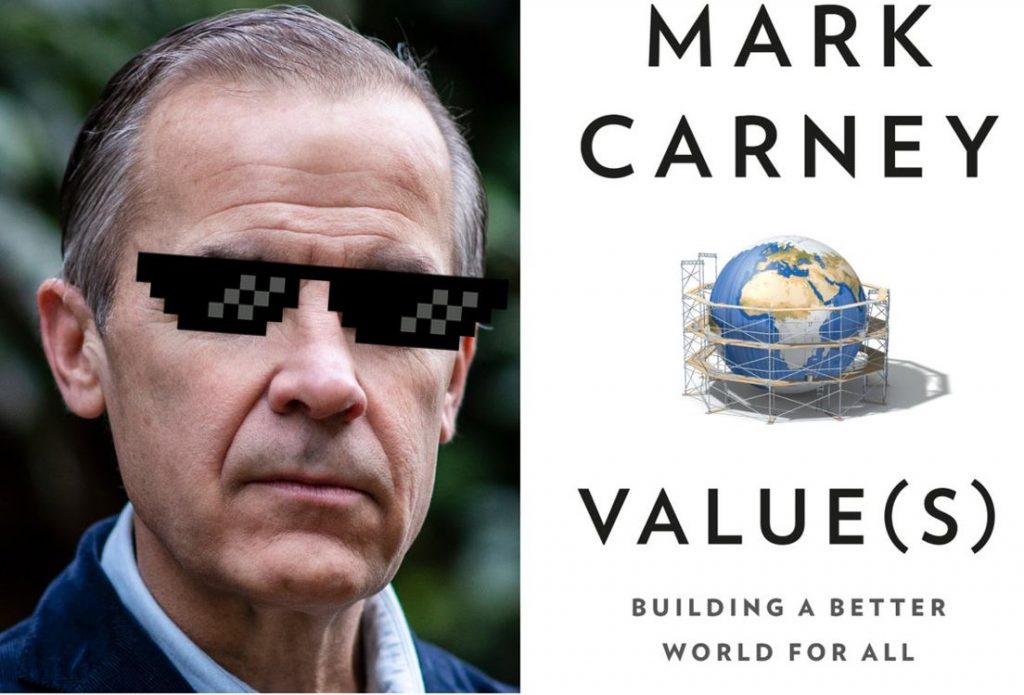
Mark Carney is a banker with a compelling track-record as well as a citizen of Canada, Ireland and the UK. He was born in 1965 in Fort Smith, Northwest Territories, Canada and has a global perspective and an impressive resume. At the same time, he could probably be your favourite prof in university. So there’s that too. In life, you should always plan for multiple paths, and so what makes this book doubly interesting is that it is possible that Carney will enter the political fray in Canada and / or seek more global posts as a thought leader in finance and banking. At the very least, teasing the thought of Carney as Prime Minister of Canada will sell a fair number of copies just for the opposition research. In a parliamentary committee testimony in May, Carney was interrogated by a conservative MP signaling that the Canadian Conservative Party is a bit scared and annoyed that Carney is helping Boris Johnson but also working with the Liberals… Guaranteed that if Carney was saying he wants to join the Conservative Party of Canada, the Tory caucus would sing his praises. Such is the absurdity of partisan politics. This book threads the needle across a fundamentally flawed ideological spectrum. And Carney offers the intellectual firepower and vision that Canada has struggled to cultivate within the legal/business class that dominate its representative democracy.
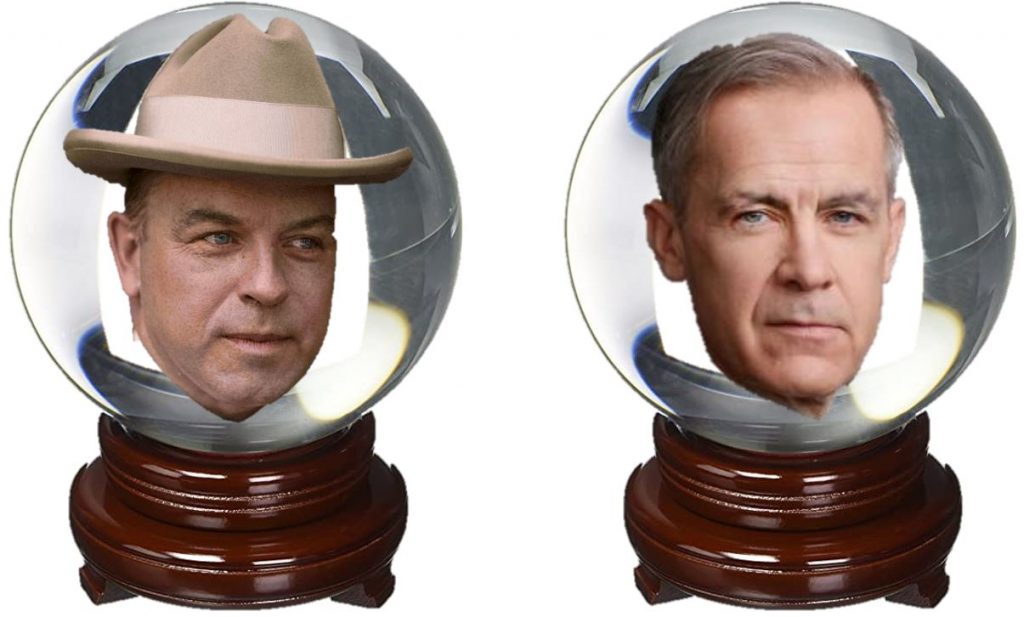
Value(s) basically advocates for the marriage of solidarity, a sense of fairness with the dynamism of markets. Markets, being social conventions, can be harnessed for good, according to Carney, who clearly lands closely to MacKenzie King, who also wrote a book before running for public office. That book was called Industry and Society which at the time was not widely read and was incoherent. The reason I mention MacKenzie King the Pragmatist In Chief is that he is typically on the top three best Prime Ministers of Canada list and Value(s) is easily the best pre-political primer since the Audacity of Hope. Value(s) is not really an emotive, poetic document but I think the rigour of Value(s) makes it a book that you can imagine is referred in 2121 as a historical document. Not kidding here. This book is really a doorway to better understanding how value has been approximated over the last few centuries.
Unfortunately, while Carney’s Value(s) is a blueprint for political leadership, it is also unapproachable for people with a reading level below Grade 8…(and maybe Grade 7 with a glass of wine because when you watch too much tv, you’re reading level slowly declines over time…the golden age of television has yet another unintended consequences, other then the decline of cinema)….. As such, this series of posts will explore his ideas (I hope clearly) as well as provide a tough critique where there is disembodiment between his theory and practice/reality.
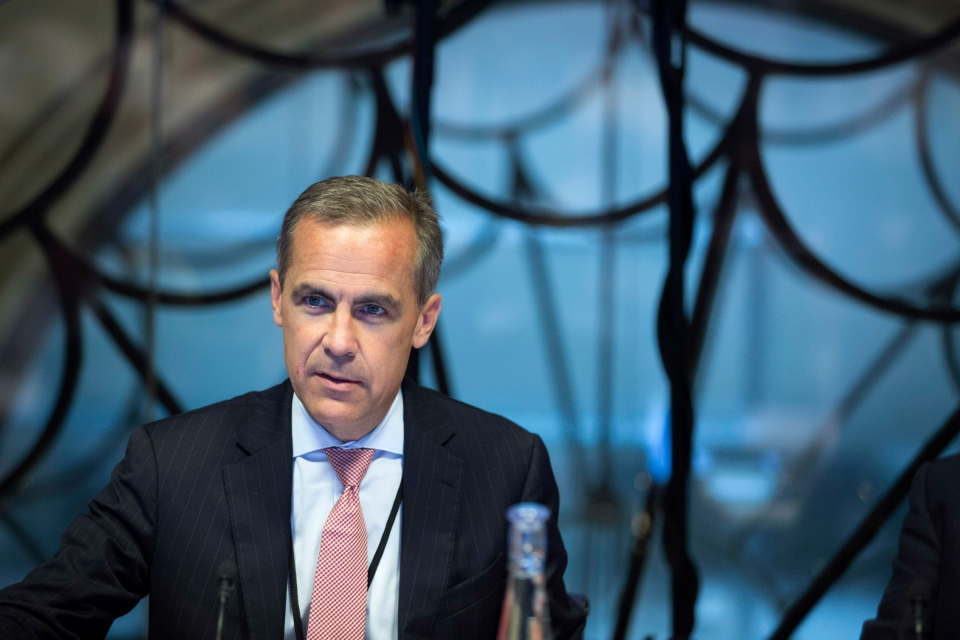
Private Sector experience:
- Goldman Sachs (1990 to 2003)
- South African international bond market launch and the Russian financial crisis were where he cut his teeth.
Current Private Sector roles:
- Brookfields (2020 to present)
Public Sector experience:
- Deputy Governor of the Bank of Canada (2003 to 2008)
- Governor of the Bank of Canada (2008 to 2013)
- Governor of the Bank of England (2013 to 2020)
Current roles:
- COP26 point-person on finance for Prime Minister Boris Johnson
- UN Special Envoy on Climate Action and Finance
Political Leanings:
Note that Carney makes no mention of the fact that he is likely advising the current Prime Ministers Office and Cabinet Ministers in Canada, in Value(s). He is a prospective Prime Minister of Canada via the Liberal Party of Canada which is the default / natural governing party in federal Canadian politics.

Mark Carney’s central question in Value(s) is:
How do we bring some humanity into our capital-centric system of valuation?
Since we observed that human nature supersede socialist command economies (acknowledging the fact that Wal-Mart and other companies are command and control entities), we ought not to try to escape capitalist markets of value measure, Carney argues, instead we should figure out:
How do we mitigate capitalism’s destructive power and harness its constructive power for a brighter future?
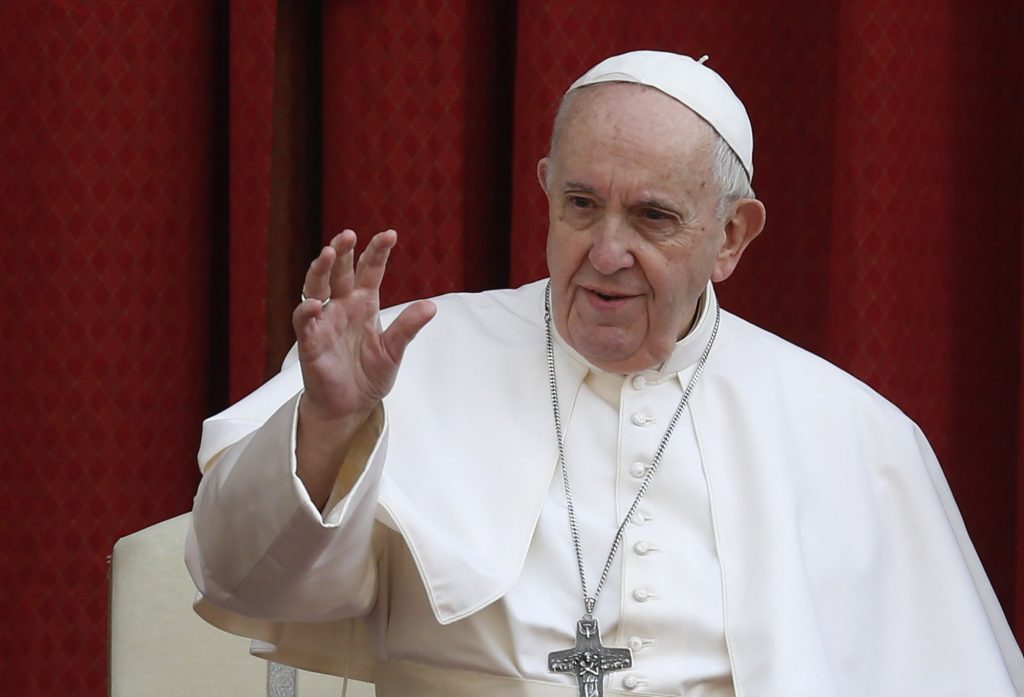
The Parable of Pope Francis: ie. markets are humanity distilled…markets take out all the best of us
Carney recounts how Pope Francis invited him, then the governor at the Bank of England (salary of £480,000 per year) and other elite decision-makers, to a conference. The pope raised a glass of grappa and said “Humanity is many things – passionate, curious, rational, altruistic, creative, self-interested. But the market is one thing: self-interest. The market is humanity distilled.” The Pope’s challenge to these insiders is “to turn grappa back into wine, to turn the market back into humanity. This isn’t theology. This is reality/ This is the truth.”….and then everybody cheered and said saluti. (Page 3, Value(s))

- How do we turn grappa back into wine?
- What’s grappa?
- The market is humanity distilled, markets of exchange are self interested actions distilled into a quantified format where the nuance is lost.
- Humanity is many things, our jobs as bankers is to turn this market back into true reflection humanity…..
Threadneedle Street Thinking:
Carney argues that radical changes are required to build an economy that works for everyone within that economy (staying vague about global, national or local economy). His audience is certainly white dominions / advanced countries that he is most familiar with as a private and public sector banker. He is threading the needle between capital or monied interests and some social democratic concepts, nominally speaking.

In order to come to that conclusion that we need our system of valuation to be adjusted to reflect more what it does presently, first Carney asks you to consider
- What is value?
- How is it grounded?
- Which values underpin value?
- Can the act of valuation in the market also reflect values in society?
- Are we under-valuing what matters most?
- Why is Amazon worth $1.5 trillion while the value of the actual Amazon rainforest(s) is $0 trillion?
- As Oscar Wilder said “we know the price of everything and the value of nothing?”
- As Albert Einstein said “not everything that counts can be counted, and not everything that can be counted counts.”
- As John Kay said “profit is to business as breathing is to living. Profit is not the purpose of business, it is necessary but not the purpose.”
- Have we moved from a market economy to a market society? Carney says “yep” and then asks how do we bring back humanity in our calculation of value?
Valuation and markets are disconnected. Values represent the principals of behaviour. Rawlsian idea of the veil of ignorance, not utilitarian or libertarian.
Three Crises:
- Credit,
- Covid,
- Climate change
Imposes costs created by this generation on future generations.
To stop the catastrophe, we need:
- Dynamism
- Resilience
- Fairness
- Responsibility
- Solidarity shared
- Humility: to act as custodians
- Sustainable globalization
- Markets are incentives to build social capital.
- Help us realize our potential.
- Leaders have to earn their legitimacy.
- Great leadership is ethical…….next Carney will look at how value is determined historically….
Analysis of Introduction Humanity Distilled:
- Not a Light Read: Carney is a bit academic and pretentious and so I don’t know that this book will be widely read, therefore, I have provided these detailed summaries for the benefit of others who don’t have the time but the inclination. This book is not a light read….
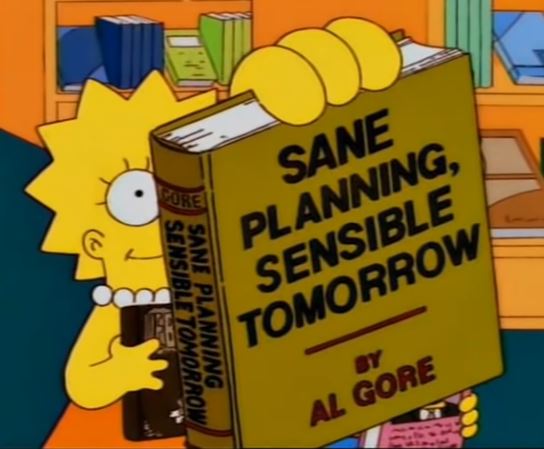
- Well Sourced: Academics like to detail to the reader ‘what you are going to learn before you learn it.’ Value(s) does this. Typically, this is a no-no. Mark Carney presents his book as a well sourced academic textbook rather than a public intellectual page-turner, it ought to be distilled which is what I’m attempting to do here. Note also that there is bias of course in the academic work that Carney sources…consensus is rare, making jobs for academics plentiful.
- Grounded Enough?: Mark Carney has the financial and global connections / rolodex and the experience from one of the most successful investment banks, for 13 years, which means he’s likely cut-throat. Or did he get where he is through sheer intellect? It isn’t clear that politics is in his blood. Politics is about winning, fighting off the other candidates and horse trading / cutting deals. Often, the choices are between bad and worse. Carney hasn’t been in that circumstance as much based on his writings here. Yes, he’s been in the top public / private sector tower of central banks but very far from the general economy or the consequences of his actions (the data that describes the consumer price index is a bit different from the abject poverty in rural Canada for example). Ironically, I speculate Carney may be more like the bankers who leveraged and imploded Canadian ABCP asset backed commercial paper in Chapter 7 then he realizes. Monday morning quarterbacking the financial crisis and being lucky doesn’t = great leadership. Having said all that, he’s still pretty cool.

- All That Glitters: At the Bank of England, Mark Carney explains as the governor touring the gold vault that those gold reserves are mostly pointless beyond a back-store of value. The gold is less valuable now that it is NOT the basis of central bank money management since finding new gold mines used to mean inflation automatically. The British pound is a FIAT currency after-all.
- Financial Community Is More Selfish Then Carney Lets On: One thing that will come up multiple times in Value(s) is that Carney underplays just how much investor folks are more self-interested then altruistic compared to a bell-curved population average. There is a stronger interest amongst financial specialists to capture a value / capital / make money which is why some folks getting into finance in the first place. This mentality is what Bill Maher / Marxism / Socialism ridicules. That ridicule asks what did you do to become so wealthy, BitCoin enthusiasts or stock speculator? Reading the market? Fundamental analysis? Financial players are mostly in the value capture game rather than value creation game and so their service is more to help price assets and to allocate capital which is valuable to be sure….but they definitely of incentivized by making money themselves over that of allocating scarce capital….
- Multiple Pathways: Perhaps influenced by his British spouse (“happy wife, happy life”), Carney is very much a British man with a Canadian accent, the book is written in British English with “s” and not “z” for equalise, organise and characterise, autumn instead of fall. In the Audible (audiobook) version of Value(s), Carney pronounced aluminum the British way (“Ali-min-ium” and not the Candian way “Aluminum”.) Expect that as a line of attack if he does join the political fray via the Liberal Party of Canada. There are multiple pathways for Carney, Canadian PM, best-selling author and another global post. It’s a win-win to suggest he’ll enter Canadian politics….it sells more books.
- Market Logic and the Ideological Spectrum Are Illusions: David Simon another brilliant man (wrote ‘The Wire” HBO show) and Mark Carney have much in common: they both protest capital as the problem and solution. I have long maintained that money is a proxy for value. It’s the values that people price that is the problem/opportunity. The wealthy tend to value putting a high price on drug offences and sending drug dealers to jail. David Simon makes a relatively cursory case for mitigating the negative effects of capitalism but the problem he and Carney have is that it is what is in human nature that needs to be harnessed. We are cruel to be kind and we are adaptable to how value is measured.
- Gell-Mann Amnesia Effect: If Carney says one thing that I think is a bit wrong, then does that error mean the areas in which he is an expert and I don’t have enough knowledge could also be wrong as well? This is known as the Gell-Mann Amnesia Effect. David Simon’s criticism of political donations do lack a bit of nuance…off topic, I know, but Simon is right about the Ideological Spectrum and is a brilliant TV writer but his views on political donations are a bit warped; The Wire and Political Donations. David Simon is misguided on political donations, first it’s often reverse causation, interests donate to the horse they think will win and or aligns with their views already. And no one will ever prove my case or otherwise conclusively as politicians vary. Second, if a politician collects $1M from special interest X and $500K from special interest Y in which Y is the opposite of X. Then the politician is not perfectly beholden to either X or Y donor, is she? Boom! The politician has $1.5M from donors that he/she will show to be satiating. Same with any one voter or one million voters. Gather up trust, potentially betray said trust with the plausible deniability of the legislative process…that is how politicians operate in a representative democracy, it’s ugly but true.
- Writing This For A Long Time: Mark Carney’s PhD thesis was “Dynamic advantage of competition.” In one sense, that’s obvious but not for people doing the dynamism. Competition is really bad for the people doing the creating. Makes you strong yes, but no one willingly supports competition at the entrepreneurial level. So this hits on the issue of the expert may not be the most appropriate person to build the future.
- Euro-Ameri-centric? Is Carney really talking about Anglo-Saxon and European conceptions of value for the most part or where is the line there? Does his message resonate with different cultures that he doesn’t work in very much? Is Value(s) getting translated into Mandarin? Will the general public read this book as closely as I have?
- Another MacKenzie King Mention Here: From a political perspective, Carney is aligned with the 3rd way style Labour party of Britain that can create successful coalitions with various interest groups with competing appreciations for economics. His embrace of the market as well as some undefined mixture of solidarity is not novel, it is precisely what MacKenzie King did by showing he could work with both labour and management in contract disputes.
- Expert/Metaphor Disconnect, Should the Pope Be Dictating Public Policy? Is it possible to turn grappa into wine? People of all socio-economic statuses drink wine, but grappa is a very European thing…is the Pope out of touch or is Mark Carney out of touch? Or am I missing out on the finer things in life? Is the Pope really just saying that human nature suggests that we need to impose agreeable behaviour? The folks who typically self-select into banking are focused on enhancing their own interests (and their shareholder by the way) by maximizing shareholder value, buying low and selling high and thus capturing value. To a certain extent value creation through the allocation of resources is certain value facilitating and thus partial value creation and value capture….
- Great Speaker: Carney gave a commencement address for the University of Toronto, 2016-2018 MBA program which was further insight into his thinking…
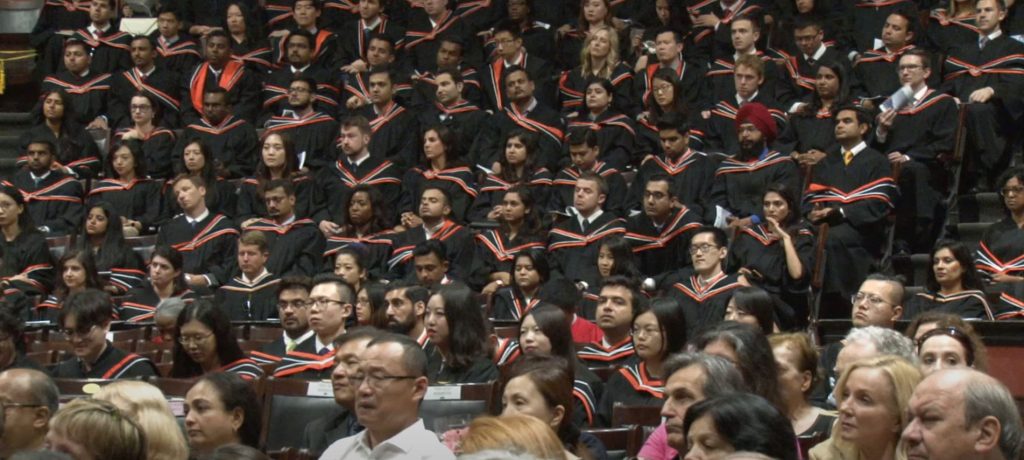

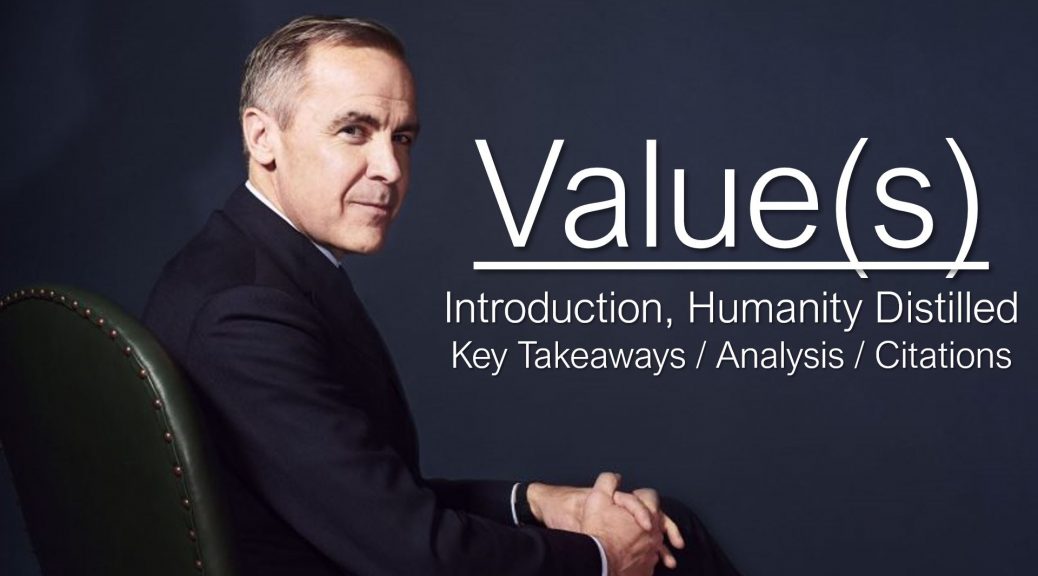
!
@
Wow, glad someone did this!